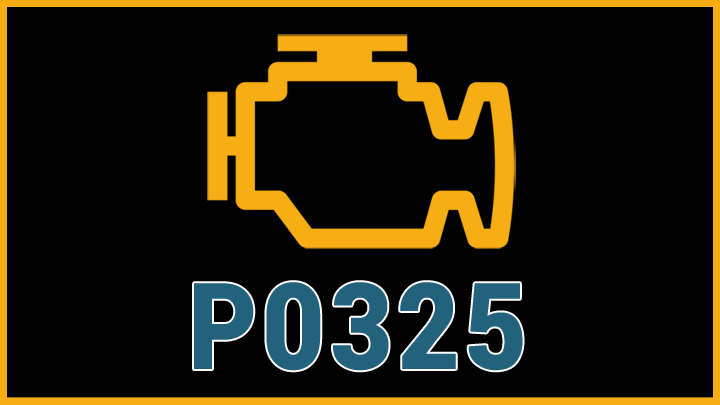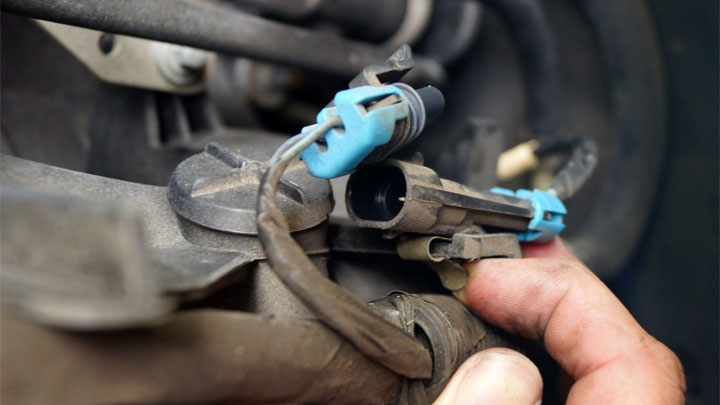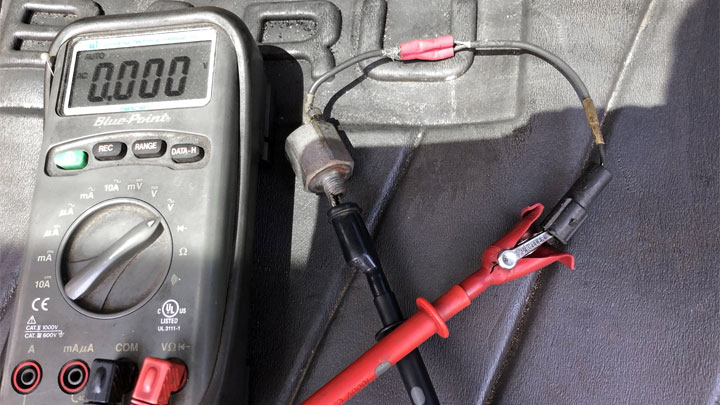P0325 Code (Symptoms, Causes, and How to Fix)
The last thing you want to see when you’re driving down the road is the dreaded check engine light. But when it does happen, you need to quickly figure out what’s going on to make sure that you’re not going to cause any further damage by ignoring it.
If after using your OBD2 scanner you learn that you have a P0325 engine code, that’s exactly what can happen if you keep driving.
But before your heart comes plummeting out of your chest, keep reading to find out exactly what’s causing your engine code. Because while it’s a serious condition, it’s usually pretty easy to fix.

What Does Code P0325 Mean?
When you have a code P0325, it means that your Engine Control Module (ECM) is getting readings from the knock sensor that is far outside of the normal range.
While the issue may be coming from the engine itself, typically, there is something wrong with the circuit or sensor, leading to the errant readings.
Either way, while the code is present, your ECM will default to a preset value, and you’ll be able to continue to drive your vehicle with noticeable symptoms.
Related: P0326 Code, P0327 Code, P0328 Code, P0332 Code
Symptoms of Code P0325

While you’ll always have a check engine light with a code P0325, engine noises are common too. Below we’ve highlighted the four most common symptoms of a code P0325 to help you diagnose the issue and get your vehicle running like new.
#1 – Check Engine Light
While it might seem redundant that an engine light is indicative of an engine code, sometimes it’s the only noticeable sign.
While that’s rare, it’s not rare for an unobservant driver not to notice any of the other symptoms beside that Check Engine light that illuminates in your dash.
#2 – Noises While Accelerating
When your vehicle has a knock sensor code, it automatically reverts to default values. While this helps protect the engine from further damages, it also throws off the timing a bit. This lag is especially noticeable during acceleration.
If you listen you’ll likely hear a pinging sound as you accelerate. The longer you leave this problem unaddressed, the louder the sound will become.
#3 – Excessive Noise While Running
While noises are most common during acceleration, it’s possible to hear sounds whenever the engine is running. This is especially true if you have a code P0325 because of an underlying engine condition instead of a faulty knock sensor.
If you hear unnatural engine noises while the engine is idling, it’s critical that you take your vehicle in for repairs as soon as possible. Failure to do so can quickly lead to additional damage to your engine.
#4 – Decreased Engine Performance
When your engine defaults to preset values, one of the first things to go is engine performance. You’ll have a noticeable drop in your ability to accelerate, but you’re also going to have a drop in fuel economy.
While this might seem like a bad thing, it’s actually giving you more time to get your vehicle to a repair shop before further damages occur.
Causes of Code P0325

While the most common cause of a code P0325 is a defective knock sensor, that’s not the only thing that could be giving you problems. Below we’ve highlighted the four most common causes of a code P0325 that you should check out before you try replacing any parts.
#1 – Defective Knock Sensor
A defective knock sensor is by far the most common symptom of a P0325 engine code. When the check engine light turns on, the ECM defaults to standard values, which is why engine performance decreases and engine noises can result.
#2 – Wiring Issues
It doesn’t matter if the sensor is working correctly if there is excessive corrosion or frayed wires. It’s not uncommon for a mechanic to spend a few days driving themselves crazy trying to figure out what’s going on when there’s a wiring issue.
#3 – Defective EGR System
Your EGR system does more than just emissions – it also keeps your engine performance-optimized. But when things aren’t running the way they should, it’s not uncommon for the engine to start making noises that it shouldn’t.
When that happens, a code P0325 can result. The sensor is working the way that it should – your engine is just making noises that it shouldn’t.
#4 – Excessive Engine Knock
Just like a defective EGR system can cause an engine knock, many conditions can lead to excessive engine noises. Broken components, a mistimed engine, and compression leaks are just a few issues that could be happening.
However, keep in mind a code P0325 typically only comes on when the readings are far out of a typical reading. So, a slight engine knock won’t usually cause this code.
Is Code P0325 Serious?
A P0325 code is a very serious engine code. If you leave a P0325 engine code unrepaired and continue to drive your vehicle, the problem will worsen. Furthermore, you can expect that the code to have adverse effects on your vehicle’s performance.
That means even if you’re lucky and the damage doesn’t get worse right away, you could still find yourself in an accident because your vehicle isn’t performing like you’re used to.
If you have a code P0325, don’t delay taking it to the shop, you’re only asking for more significant problems to come up.
How to Fix

While the only surefire way to replace the right part the first time is to hook up an automotive scan tool and see exactly what’s going on, if you’re looking to take a risk and potentially save a few bucks, you can try replacing the knock sensor and hoping that was the problem.
However, if it’s not, you’ll need to start a little more troubleshooting. Double-check the wiring and use a multimeter to determine if you have excessive resistance in the circuit and ensure that you have power when you’re supposed to.
If you’re still not finding the cause of your problem, you might need to take it to a mechanic. They’ll be able to hook up all the proper diagnostic equipment to get a better look at what’s going on inside your engine.
- P0521 Code (Symptoms, Causes, How to Fix) - Mar 22, 2024
- How to PROPERLY Clean 5 Types of Steering Wheel Materials - Feb 19, 2024
- What Should You Do If Your Check Engine Light Comes On? - Nov 6, 2023
